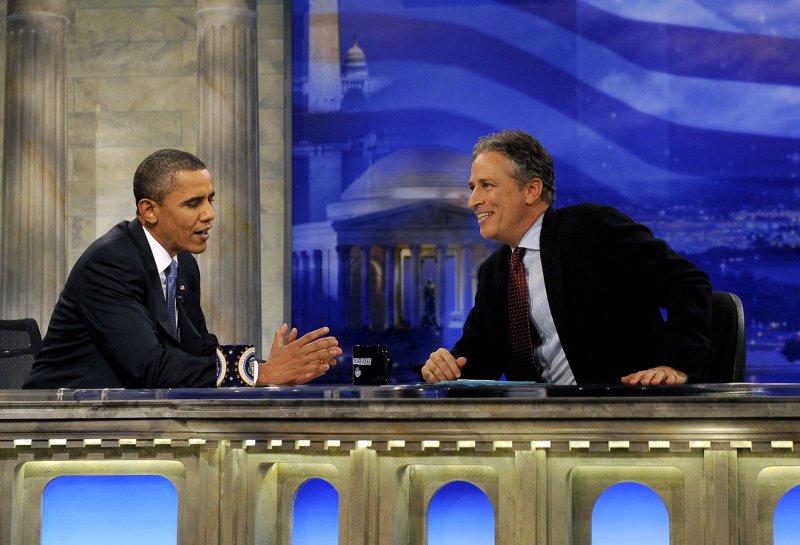U.S. President Barack Obama chats with Daily Show host Jon Stewart during a commercial break in taping in Washington on October 27, 2010. UPI/Roger L. Wollenberg |
License Photo
WASHINGTON, Oct. 29 (UPI) -- The 1963 March on Washington, during which Martin Luther King Jr. gave his historic "I Have a Dream" speech, set a record for turnout with 250,000 people and was organized by a grassroots coalition of labor unions, civil rights groups, student activists and religious institutions.
By comparison, the "Rally to Restore Sanity" and the "March to Keep Fear Alive" on Saturday have more than 300,000 combined registered attendees via Facebook and were initiated by a pair of cable TV comedians. Instead of King's idealism, the overarching sentiment hosts Jon Stewart and Stephen Colbert express on their respective shows is chic cynicism.
The rallies -- although able to capture some Americans' political exasperation -- are ostensibly in response to Glenn Beck's "Restoring Honor" event in August.
Experts on social movements and activism are skeptical that anything substantive will come out of the rallies.
"Social movements are not about building ratings," said Tom Hayden, a founding member and former president of the Students for a Democratic Society. "No organizations will come out of this. No clubs will be formed. No chapters will be formed."
Cecil Blake, a professor of Africana Studies at the University of Pittsburgh who teaches classes on social movements, agreed.
"You have two men, Colbert and Stewart, who are trying to make a point," he said. "But I don't know the extent to which they have the organizational set up that would support the formation of an organization that will eventually make certain that whatever ideas they have would be promulgated to the extent that it's going to impact upon society at large."
What has happened to U.S. society in the years since the March on Washington to create the environment in which three television hosts have the power to commandeer large-scale political gatherings?
The rise of technology is certainly one answer, Robert Thompson, professor of popular culture at Syracuse University, said.
"A couple generations ago we had three TV networks and no Internet. There were not that many places for these kinds of personalities to emerge and collect the kinds of bases that they have," Thompson said.
"Up until the cable era we had Johnny Carson and 'Saturday Night Live.' Carson told jokes about politics but he was not a political humorist and was not by any means a trenchant observer of political wrongdoing. 'Saturday Night Live's' excuse for political humor was Chevy Chase falling over a podium every week to make fun of how Gerald Ford was clumsy. That was hardly political satire."
Thompson said he believes that comedians from decades past, like the Smothers Brothers and Lenny Bruce, would have had ample material to exercise serious political humor the way that Stewart and Colbert do now but restrictions on speech prevented that type of humor from taking off until the past couple decades.
"What we've got now is enough places for certain kinds of comedians that never would have found a space in the old network era to do what it is that they do," Thompson said. "Once cable came along it provided nurseries for people like Bill Maher and Jon Stewart. And of course, the content restrictions were opened up."
While the growth of cable television and the Internet have allowed political humorists to emerge on a massive scale, sports writer and political activist Dave Zirin said a unique political environment is also contributing.
"There's a very real vacuum in this country," he said. "Both political parties are so deeply entrenched in Washington, D.C., politics and awash in corporate money. The rest of the country is highly polarized and suffering under the weight of this endless recession. People are angry, people are desperate, people are desperate to believe in something. Here are the figures walking right out of the TV."
And that's not necessarily a bad thing, nor does it mean an end to traditional protest, said Zirin, who attended the "One Nation Working Together" march sponsored by organized labor Oct. 2.
"I believe strongly that what [the recent personality-led rallies] mean is not so much the replacement of the old model, but more people sitting at the table and the idea of using popular pressure to effect change," he said. "It's a net positive because far more important than what's said from the stage are the people you interact with while you're there on the ground; the potential for people to really have life-altering experiences and the feeling of empowerment as being part of a collective. Even if [the personality] is what brought them there, it's not going to be what sustained them when they leave."





